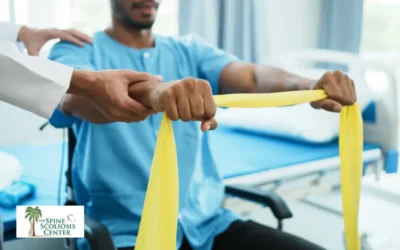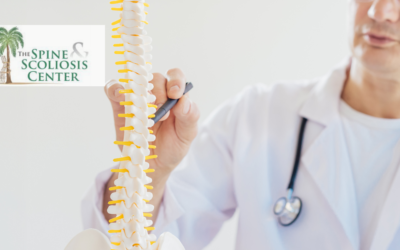Discs cushion the bones (vertebrae) in your spine, and allow for mobility. These discs are like small round pillows, consisting of a nucleus enveloped by a tough, outer layer (annulus), and function as shock absorbers for the bones of the spine. A herniated- also commonly referred to as slipped, bulged, or ruptured- disc is when a piece of the disc nucleus is forced out of the annulus and into the spinal canal due to a rupture or tear in the annulus. Herniated discs are typically starting to degenerate, and since the spinal canal has limited space, the disc becomes displaced and presses on spinal nerves, often resulting in significant pain. Read on to learn more about herniated discs and how experienced specialists at the Spine and Scoliosis Center can help.
Causes Of Herniated Discs
A single excessive injury or strain may result in a herniated disc. However, degeneration of disc material, which naturally occurs as you age, causes the ligaments that hold the disc in place to weaken. A relatively minor twisting movement or strain can result in a ruptured disc if the disc is degenerated enough. Disc problems may be more prone in certain individuals than others, and thus some people may suffer several herniated discs in different places along the spine. There may also be a genetic predisposition for herniated discs.
Symptoms Of Herniated Discs
Symptoms of herniated discs are highly variable depending on the specific size of the herniation and the position of the herniated disc. If the herniated disc isn’t pressing on a nerve, the patient may now have any pain at all, or the pain may be extremely minor. If the disc is pressing on a nerve, pain, numbness or weakness may occur in the area of the body the nerve travels to. Generally, a herniated disc may result in an episode of lower back pain or chronic intermittent episodes of low back pain.
When To Seek Medical Care
Most herniated discs don’t require surgery and symptoms typically improve on their own in 90% of cases. The length of time it takes for symptoms to improve can range from a couple weeks to a few days. Some things to consider regarding when and how to seek medical care:
- Limit physical activity for 2-3 days. If you’re able to walk, do so, and you can also take an anti-inflammatory like ibuprofen. Bedrest isn’t typically recommended.
- Consult with your primary care provider regarding non-surgical treatments like physical therapy.
- The American College of Radiology doesn’t recommend radiographic imaging like an MRI unless symptoms have been present for six weeks.
- If symptoms linger for longer than four weeks, your primary care physician may refer you to a spine specialist such as a neurosurgeon from The Spine and Scoliosis Center. A specialist will typically order advanced imaging like an MRI before you show up to the appointment for evaluation.
- If you experience significant leg/arm weakness, loss of bowel function, loss of feeling in the genital/rectal region, significant recent fever or infection, a history of metastatic cancer, radiculopathy along with all these, or a significant injury/fall that resulted in the pain, immediately seek medical attention. If there is progressive weakness or other signs of progressive neurologic deficit, you should seek medical attention as soon as possible.
Contact Us Today
While a herniated disc isn’t a major problem a lot of the time, certain cases may require treatment. If a herniated disc is preventing you from enjoying everyday activities or causing significant pain, call The Spine and Scoliosis Center to schedule an appointment with a top Florida spine specialist today.




0 Comments